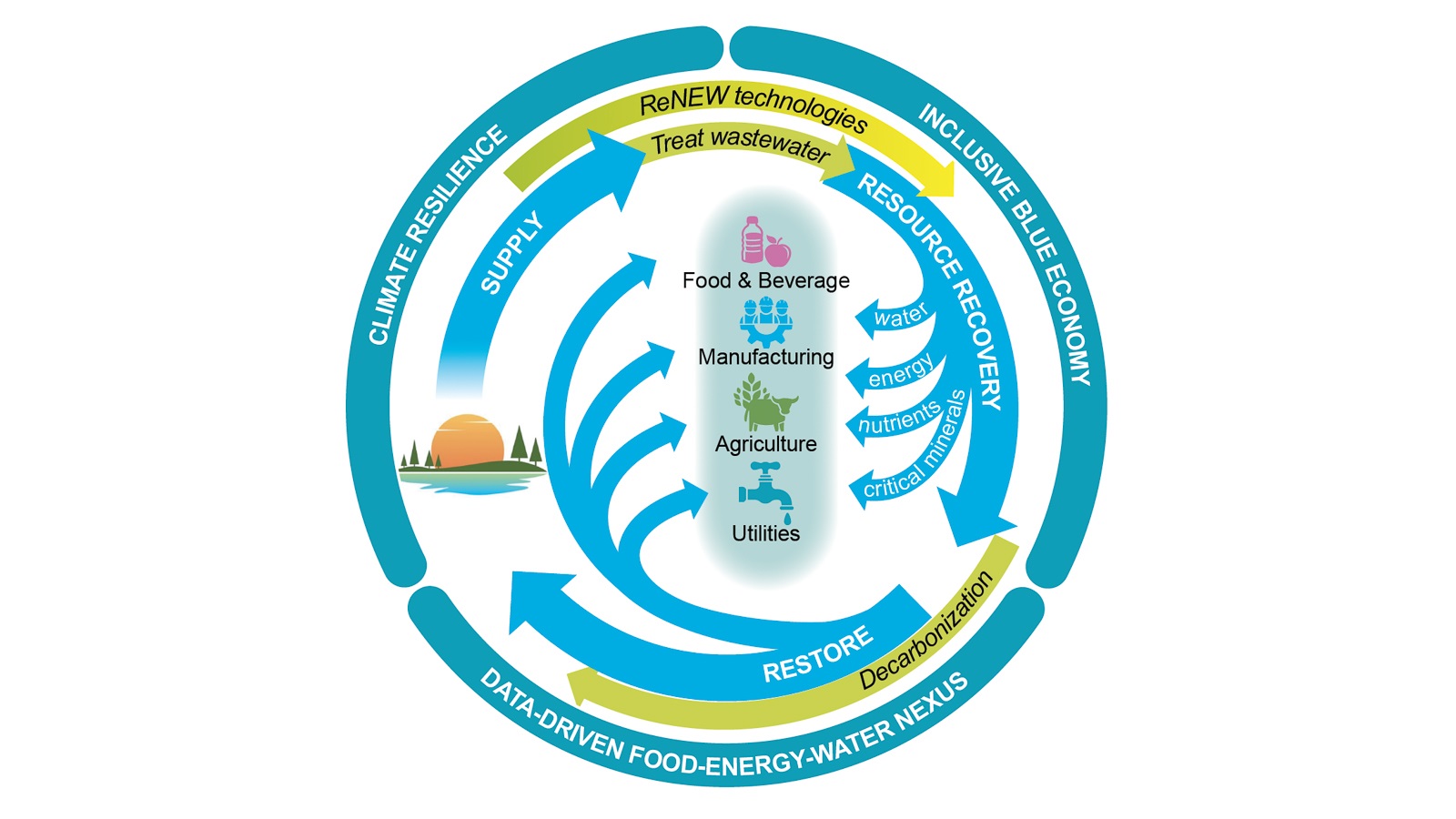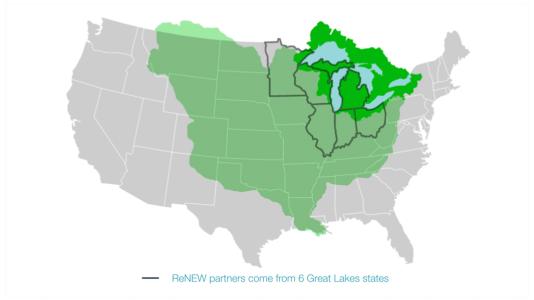
The waste in our water could soon generate new waves of clean energy development, job creation and economic growth across the Great Lakes thanks to a new regional innovation and economic development initiative launched by the U.S. National Science Foundation (NSF). The initiative will fund efforts to find new ways to recover clean water, nutrients and materials for clean energy technologies from wastewater — all while removing dangerous chemicals.
These efforts will be carried out by Great Lakes ReNEW, a collaboration of research institutions, universities, utilities, investors and development organizations spanning six states. ReNEW is led by Current, a Chicago-based, water-focused innovation hub. The U.S. Department of Energy’s (DOE) Argonne National Laboratory and the University of Chicago are partners in the effort.
“We are excited to leverage Argonne’s expertise to partner with ReNEW in building a water-focused, innovation-driven ecosystem that spurs economic development and creates pathways to water jobs across the Midwest.” — Meridith Bruozas, institutional partnership director at Argonne and inclusive innovation lead for ReNEW
Great Lakes ReNEW will work from an initial $15 million grant that covers its activities in Illinois, Ohio and Wisconsin for the first two years. It can unlock up to $160 million in NSF funds for use across all member states by meeting certain milestones beyond that.
“Great Lakes ReNEW aims to turn water-focused innovation into new technologies and businesses that can drive economic development in the Great Lakes region,” said Seth Darling, chief science and technology officer for Argonne’s Advanced Energy Technologies directorate and Argonne lead for ReNEW. “Within ReNEW, Argonne brings a unique suite of capabilities that will help bridge the various sectors and facets of the project: our pioneering research and development capabilities across water and energy, our proven record for getting scientific discoveries out of the lab and into the marketplace, and our long-standing commitment to community outreach and workforce development.”

“Waste not water”
Clean water is essential to our health and survival. According to Darling, ReNEW’s efforts will focus more on what is in the water than on the water itself — and how to remove those substances in ways that create economic opportunities for local residents.
For example, municipal wastewater often contains nutrients such as phosphorous and nitrogen, which can be reused in fertilizer. Industrial waste streams can also contain materials that have considerable value for manufacturing, such as lithium, cobalt and nickel. All three are critical components in rechargeable battery technologies. These technologies power our personal devices, electric vehicles and more.
Argonne is a leading developer of battery technologies, which will play a critical role in the transition away from fossil fuels. Currently, most of the lithium, cobalt and nickel used in batteries comes from other countries. That could change if ReNEW can help develop safe and cost-effective ways to recover these from industrial wastewater streams. Harvesting lithium from this feedstock would help secure our supply of this critical material. It would help preserve U.S. leadership in rechargeable battery development and could create new jobs and economic opportunities for residents in the region.
Overcoming separation anxieties
Recovering substances from wastewater for commercial reuse is easier said than done. Existing processes for doing so can be technically complicated, and the costs often outweigh the value of the results.
Fortunately, Argonne is already pioneering innovative methods for separating contaminants and other substances from water. Many of these techniques use advanced membranes and biological reactions to make extraction more cost-efficient. These have been especially effective in green energy and manufacturing applications.
Separation technologies are just one of Argonne’s water research focus areas. Argonne researchers also work across disciplines to confront challenges and find solutions in other water-related fields. These include manufacturing, materials, modeling and artificial intelligence/machine learning, sensors and control and sustainability. Argonne’s expertise in all of these areas will help ensure that ReNEW can unlock all $160 million of NSF’s grant over the next 10 years.
“Argonne and UChicago have been partnering with Current on water research and innovation for several years now,” said Junhong Chen, professor at the Pritzker School of Molecular Engineering at University of Chicago and Argonne lead water strategist, as well as co-PI and use-inspired R&D Lead for ReNEW. “This NSF Regional Innovation Engines award is a testimony of our growing partnership and impact.”
Turning innovation into equitable opportunity
The $160 million in potential funding for Great Lakes ReNEW is part of a potential $1.6 billion commitment by NSF to create regional innovation engines like Great Lakes ReNEW across the U.S. over the next 10 years. This would be one of the single largest investments in regional research and economic development in the nation’s history. And its goal goes beyond spurring innovation: it also aims to stimulate economic growth in regions that have not fully benefited from the rise of the technology sector in recent decades.
To help residents take full advantage of the opportunities that the innovation engine creates, ReNEW will provide a regional infrastructure that supports local education and workforce providers in building career pathways across the water industry. This comprehensive workforce development program spans the Midwest, starting in Illinois, Wisconsin and Ohio. It will include efforts at the K-12, trades and unions, community college and university levels.
“We are elated to be part of the transformational effort to develop the water workforce of the future,” said Meridith Bruozas, institutional partnership director at Argonne and inclusive innovation lead for ReNEW. “Argonne has a strong record for creating robust STEM career pathways in fields such as computing, energy storage and cybersecurity. And our efforts reach more than 35,000 students across all levels. We are excited to leverage our expertise and partner with ReNEW in building a water-focused ecosystem that creates pathways for water jobs across the Midwest.”
Argonne has employed a STEM outreach model that it developed in collaboration with Digital Youth Network from Northwestern University, called the STEM Opportunity Landscape Project. The model maps STEM resources in communities via an online platform. Doing so helps Chicago’s South Side residents to find these resources more easily and enables providers of these resources to partner up and improve their reach.
“This is an example of how regional infrastructure can support local workforce development efforts,” Bruozas said. “By connecting people, places and programs around a specific industry, we can help develop space for jobs and career opportunities.”
If successful across these facets, Great lakes ReNEW can create a water-focused innovation ecosystem that will help accelerate our green energy transition, foster the development of a more circular economy in the region, and provide richer, more equitable outcomes for residents across the Great Lakes.

